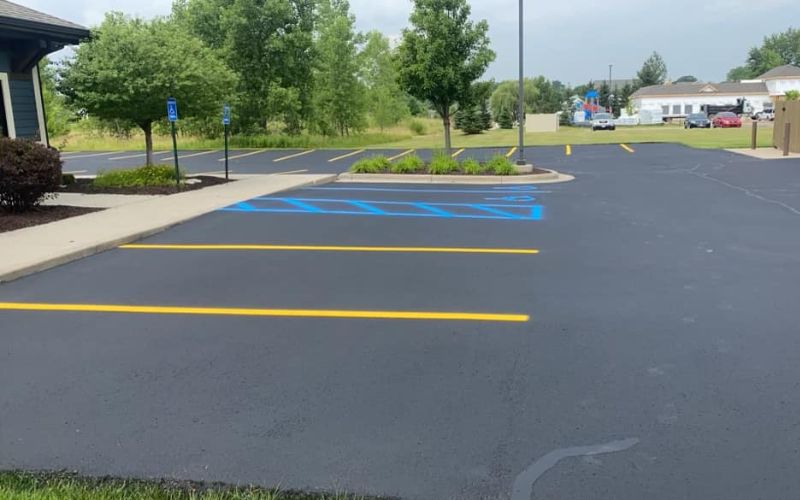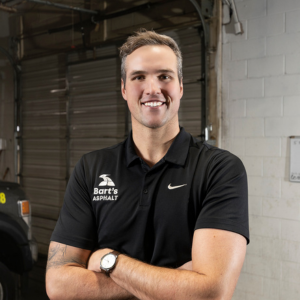For commercial property owners in Michigan, protecting your asphalt investment against our harsh and variable climate presents a significant challenge. From freeze-thaw cycles that create cracks to summer UV damage that accelerates aging, Michigan’s weather constantly tests your pavement’s durability. Among the various maintenance options available, sealcoating stands out as one of the most effective protective measures for commercial asphalt surfaces.
Sealcoating provides a vital protective layer that shields your pavement from the elements, prevents water infiltration, and slows the oxidation process that leads to brittleness and failure. For commercial properties with substantial paved areas, this preventative maintenance approach can extend pavement life by years while dramatically reducing long-term repair and replacement costs.
Bart’s Asphalt has protected commercial pavement throughout Michigan for years, developing specialized expertise in commercial-grade sealcoating applications. This guide explains why sealcoating is particularly important for Michigan commercial properties and how the proper application process ensures maximum protection and value.
Understanding Asphalt Deterioration in Michigan's Climate
Michigan’s climate creates a perfect storm of deterioration factors for asphalt surfaces. Our winter freeze-thaw cycles force water into microscopic cracks, expanding as it freezes and creating progressively larger openings in the pavement structure. These cycles can occur dozens of times each winter, accelerating damage with each fluctuation.
Road salt and ice-melting chemicals, essential for winter safety, simultaneously attack the asphalt binder that holds pavement together. These chemicals penetrate the surface and break down the adhesive properties of the binder, leading to aggregate loss and surface deterioration. Meanwhile, summer brings intense UV radiation that oxidizes asphalt oils, causing the pavement to become brittle and more susceptible to cracking.
Water infiltration represents perhaps the most significant threat, as it undermines the structural base beneath the asphalt surface. Once water penetrates through cracks into the base material, it weakens the foundation and creates conditions for potholes, depressions, and eventual pavement failure. For commercial properties with heavy vehicle traffic, these weakened areas quickly deteriorate under repeated loading.
What Is Commercial Sealcoating?
Commercial sealcoating consists of applying a specialized protective emulsion to asphalt surfaces. Unlike residential formulations, commercial-grade sealcoating contains higher concentrations of protective solids, specialized polymers, and reinforcing additives designed to withstand the demands of business properties. These formulations provide enhanced durability, increased skid resistance, and improved resistance to automotive fluids and chemicals.
The composition of modern commercial sealcoating has evolved significantly from earlier coal tar-based products. Today’s advanced asphalt-based emulsions and polymer-modified formulations offer superior environmental performance, greater flexibility, and enhanced durability under commercial traffic conditions. These specialized materials adhere to the existing asphalt surface, filling minor surface voids while creating a renewable wear layer.
Commercial applications differ substantially from residential treatments in both material composition and application thickness. Business properties typically receive heavier applications with multiple coats to withstand more intensive use patterns. The professional-grade materials used for commercial properties contain higher percentages of solids and specialized additives that enhance performance under heavy traffic conditions.
The Science Behind Sealcoating Protection
Sealcoating works through several protective mechanisms that simultaneously shield your pavement from different deterioration factors. The primary function involves creating a waterproof barrier that prevents moisture penetration. This waterproofing effect keeps water from infiltrating the pavement structure and causing base failure, particularly critical during Michigan’s freeze-thaw cycles.
The formulation also provides significant UV protection by shielding the underlying asphalt from direct sun exposure. This protection slows the oxidation process that naturally occurs as asphalt ages, preserving the pavement’s flexibility and resilience. By maintaining these properties, sealed asphalt better accommodates temperature fluctuations and traffic loading without developing cracks and failures.
Additionally, sealcoating creates a sacrificial wear layer that absorbs daily abrasion and chemical exposure. This surface protection prevents automotive fluids, deicing chemicals, and other contaminants from directly contacting and degrading the structural asphalt beneath. For businesses with frequent deliveries or high vehicle turnover, this chemical resistance significantly extends pavement life.
Signs Your Commercial Property Needs Sealcoating
Several visual indicators signal when your commercial property requires sealcoating. Fading from the rich black of new asphalt to a grayish appearance indicates oxidation has begun. This color change represents more than an aesthetic issue – it signals that the pavement is losing the oils that provide flexibility and water resistance, becoming increasingly brittle and vulnerable.
Surface texture changes provide another important indicator. As asphalt ages, the fine particles in the matrix begin to wear away, exposing larger aggregate and creating a rougher, more porous surface. This condition, known as raveling, accelerates once it begins, creating an increasingly receptive environment for water penetration and freeze damage.
In Michigan’s climate, most commercial asphalt should receive sealcoating every 2-3 years, though high-traffic areas may require more frequent application. Properties that postpone this maintenance typically experience an acceleration of damage, particularly after the 3-year mark. The resulting repairs often cost 4-5 times what preventative sealcoating would have required, representing a significant missed opportunity for cost control.
The Commercial Sealcoating Process
Professional commercial sealcoating begins with thorough property assessment and preparation. This critical phase includes identifying areas requiring repair before sealing, evaluating drainage patterns, and creating an application plan that minimizes business disruption. For larger commercial properties, this often involves phasing the work to maintain access throughout the process.
Surface preparation forms the foundation for effective sealcoating. Professional contractors use commercial-grade cleaning equipment to remove embedded dirt, automotive fluids, and other contaminants. Vegetation removal along pavement edges, crack cleaning, and oil spot treatment with specialized primers ensure proper adhesion. Any necessary repairs, including crack sealing and patching, must be completed and properly cured before sealcoating begins.
Application techniques vary based on property size and configuration. Large commercial parking lots typically receive sealcoating through spray application or specialized distribution vehicles that ensure consistent coverage. Critical areas often receive attention through hand application methods that allow for careful edge work and detailed coverage. Professional application typically involves two coats: a slightly diluted base coat that promotes adhesion and penetration, followed by a full-strength surface coat that maximizes protection.
Proper curing represents a crucial but often overlooked step in the process. Depending on temperature and humidity conditions, commercial sealcoating requires 24-48 hours before allowing vehicle traffic. Premature traffic can damage the coating and significantly reduce its protective capabilities. Professional contractors implement traffic control measures, including barriers and phasing strategies, to protect fresh applications while maintaining business access.
Optimal Timing for Michigan Commercial Sealcoating
Michigan’s weather patterns create specific timing considerations for commercial sealcoating. The ideal application window typically runs from late spring through early fall when temperatures consistently remain above 50°F both day and night. Application requires dry pavement and no rain in the forecast for at least 24 hours, making weather monitoring a critical part of project planning.
Beyond weather considerations, timing should align with your business operations whenever possible. Many commercial properties schedule applications during slower business periods, overnight hours, or weekends to minimize disruption. For retail businesses, early-week applications often work best, while office complexes might prefer weekend work when buildings have lower occupancy.
The optimal interval between sealcoating applications depends on several factors including traffic volume, exposure conditions, and prior maintenance history. Most Michigan commercial properties benefit from reapplication every 2-3 years, though high-traffic areas or properties with intense sun exposure may require more frequent treatment. Regular professional assessments help determine the optimal timing for your specific property.
Cost-Benefit Analysis of Commercial Sealcoating
Commercial sealcoating represents one of the most cost-effective maintenance investments available for paved surfaces. In Michigan, professional commercial applications typically cost between $0.15-$0.25 per square foot depending on surface condition, property configuration, and specific material requirements. For perspective, a 50,000 square foot commercial parking lot would typically require an investment of $7,500-$12,500 for complete sealcoating.
This investment delivers substantial returns through extended pavement life. Regular sealcoating typically adds 5-7 years to asphalt lifespan before major rehabilitation becomes necessary. Given that complete asphalt replacement costs between $3.50-$5.00 per square foot in Michigan, even a single year of extended life represents significant savings for commercial property owners.
Beyond direct pavement life extension, sealcoating reduces ongoing repair costs by preventing water infiltration and base failures that lead to potholes and major deterioration. Properties with regular sealcoating programs typically spend 40-60% less on interim repairs compared to those without protective maintenance. Additionally, the improved appearance enhances property value and professional presentation, particularly important for retail, hospitality, and professional service businesses.
Common Sealcoating Mistakes to Avoid
Several common mistakes can compromise sealcoating effectiveness, particularly when inexperienced contractors handle commercial properties. Inadequate surface preparation represents the most frequent issue, as contaminants prevent proper adhesion. Professional commercial applications require thorough cleaning with specialized equipment rather than simple sweeping or blowing.
Material dilution presents another significant concern. Some contractors over-dilute sealcoating materials to reduce costs or speed application, resulting in insufficient protection. Commercial-grade applications require specific dilution ratios based on surface condition and traffic exposure. Similarly, improper mixing of additives can compromise performance, particularly for properties requiring enhanced traction or durability.
Application during marginal weather conditions frequently leads to failures. Applying a sealcoat when temperatures may drop below 50°F, when rain threatens, or on pavement that hasn’t completely dried after cleaning compromises both immediate results and long-term performance. Professional contractors monitor extended forecasts and maintain flexible scheduling to ensure optimal application conditions.
Insufficient curing time causes many premature failures, particularly in commercial settings where business pressures may encourage reopening parking areas too quickly. Professional contractors implement phased approaches and clear communication to ensure fresh sealcoating receives proper curing time while maintaining business accessibility through creative traffic management.
Choosing a Professional Commercial Sealcoating Contractor
Selecting the right asphalt sealcoating contractor significantly impacts your sealcoating results. For commercial properties, specialized expertise in business property applications is essential. Look for contractors who understand commercial traffic patterns, business operation needs, and property management concerns rather than those primarily focused on residential work.
Material quality varies significantly between contractors. Ask potential providers about their specific sealcoating formulation, solid content percentage, and specialized additives for commercial applications. Premium contractors use commercial-grade materials with higher concentrations of protective components rather than standard residential formulations, delivering better long-term performance for business properties.
Proper equipment indicates a contractor’s commitment to professional application. Commercial sealcoating requires specialized distribution systems, professional cleaning equipment, and appropriate traffic control devices. Ask potential contractors about their specific equipment and how it ensures consistent application across large commercial areas.
Insurance coverage and warranties provide important protection for commercial property owners. Verify that potential contractors carry appropriate commercial liability insurance, workers’ compensation coverage, and vehicle insurance. Additionally, professional contractors should offer clear warranty terms that address both material and workmanship considerations rather than limited or ambiguous guarantees.
How Bart's Asphalt Approaches Commercial Sealcoating
Bart’s Asphalt has developed a specialized approach to commercial sealcoating that addresses the unique needs of business properties. Their process begins with a comprehensive site assessment that evaluates current condition, identifies necessary preparatory repairs, and develops a customized application plan aligned with your business operations.
Their commercial applications use premium materials specifically formulated for Michigan’s climate conditions. These professional-grade sealcoating formulations contain higher percentages of protective solids, specialized polymers for flexibility, and reinforcing additives that enhance durability under commercial traffic loads. For properties with specific requirements, they offer formulation adjustments that address unique conditions or use patterns.
Application procedures focus on minimizing business disruption while ensuring complete protection. Their phased approach maintains access to critical areas throughout the process, with clear communication and professional traffic management. For businesses with specific operational requirements, they offer flexible scheduling options including night work, weekend application, and coordinated timing around business peaks.
Quality control measures distinguish their commercial applications, with detailed attention to proper thickness, complete coverage, and careful edge work. Their experienced crews understand the specific requirements of different commercial property types, from retail centers with cart traffic to industrial properties with heavy vehicle loads. This specialized knowledge ensures appropriate application techniques for each specific use case.
Maintaining Your Sealcoated Commercial Asphalt
After professional sealcoating, ongoing maintenance helps maximize both appearance and protection. Regular cleaning using commercial sweeping services removes abrasive debris and prevents contaminant buildup that could damage the protective surface. For Michigan properties, this cleaning becomes particularly important during spring when winter sand and debris accumulation can accelerate wear.
Prompt attention to chemical spills preserves both appearance and function. Automotive fluids, particularly petroleum products, can damage sealcoating if allowed to remain in contact for extended periods. For businesses with higher exposure risk, such as auto service centers or delivery hubs, establishing cleaning protocols for accidental spills helps prevent localized damage.
Winter maintenance practices significantly impact sealcoating longevity. Using modern ice-melting products rather than rock salt reduces chemical damage, while prompt snow removal prevents extended exposure to freeze-thaw conditions. Professional snow contractors should adjust blade heights to prevent scraping damage to the protective coating, particularly during the first winter after application.
Regular professional assessment helps determine when reapplication becomes necessary. Most commercial properties benefit from annual inspections that evaluate coating condition, identify potential issues, and recommend appropriate timing for maintenance activities. This proactive approach ensures consistent protection while allowing for planned budgeting rather than reactive emergency repairs.
Wrapping Things Up
Commercial asphalt sealcoating represents one of the most impactful maintenance investments available for Michigan business properties. By creating a protective barrier against our harsh climate conditions, sealcoating extends pavement life, reduces repair costs, and maintains professional appearance. For commercial property owners and managers, implementing a regular sealcoating program delivers measurable returns through both direct cost savings and enhanced property presentation.
The specific challenges of Michigan’s climate make protective maintenance particularly crucial for commercial asphalt. From freezing winters to hot summers, our weather patterns accelerate deterioration processes that compromise pavement integrity. Proper commercial-grade sealcoating creates multi-layered protection against these forces, preserving your asphalt investment through changing seasons and years of service.
Contact Bart’s Asphalt today for a comprehensive assessment of your commercial property’s sealcoating needs. Their specialized knowledge of commercial applications and Michigan’s specific conditions ensures your property receives optimal protection tailored to your business requirements. With their professional approach and quality materials, they help commercial property owners throughout Michigan maximize their pavement investment through effective preventative maintenance.



